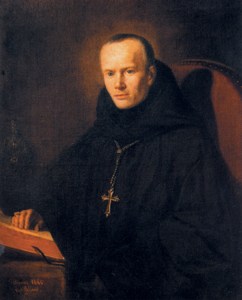
Knights Templar – Soldiers of Christ
To a Christian, strength is salvation; for man’s life on earth is a warfare.
℣. In thy resurrection, O Christ, alleluia.
℟. Let heaven and earth alleluia.
Jesus bestows an inestimable gift upon his Apostles; and from this gift there proceed two Sacraments. On the sixth day of the Creation, the Divine Word infused his breath into Man, whose body he had formed out of the slime of the earth; and immediately this body was animated by a soul, bearing upon it the image of God. On the evening of the day of his Resurrection, the same Divine Word, then made visible in the flesh he had assumed, suddenly appeared in the midst of his Apostles, and said to them: Peace be to you! As the Father hath sent me, I also send you. (John 20:21) Then breathing upon them, he added, in a tone of command: Receive ye the Holy Ghost! (John 20:22)
What is this Breath, which is not given to all men but only to a few chosen ones? Jesus himself explains it by the words he speaks: this Breath imparts the Holy Ghost to them that receive it. The Holy Ghost is given to the Apostles, because they are sent by Jesus, as Jesus is sent by the Father.
The Apostles, then, receive this Divine Spirit, in order that they may communicate him to men, just as they themselves have had him given to them by Jesus. The Church’s tradition fills up the brief account of the Gospel. Two Sacraments, as we have already stated, take their origin from this act of our Risen Jesus, who, afterwards, instructed his Apostles as to the rites wherewith each of the two was to be administered.
The first of these two Sacraments is Confirmation, for whose institution we will return our humble thanks today; the other is Holy Orders, which we will explain further on in the week: both of them belong, in their administration, to the Episcopal character, which is the source whence flow the gifts conferred upon the Apostles for man’s sanctification.
Such is the importance of the Sacrament of Confirmation, that until such time as we have received it, we cannot be considered as perfect Christians. It is true that, by virtue of our Baptism, we are Children of God, Members of Christ and his Church; but as Christians, we are Soldiers—we have to Confess our faith, sometimes before tyrants, and even to the shedding of our blood; sometimes before the world, whose false seductive maxims are the occasion of so many apostasies; sometimes against Satan and his wicked angels, whose power is so justly feared by the servants of Christ. The seal of the Holy Ghost confers on us a degree of strength which Baptism does not give. Baptism made us citizens of the Church: Confirmation makes us Soldiers of God and of his Christ. Again, it is true that we can fight and conquer with the armor of Baptism; such is God’s will, who knows that the Sacrament which perfects the Christian is sometimes an impossibility; but woe to them that neglect to receive the completion of their Baptism! Hence, after administering the Sacrament of regeneration on Holy Saturday, the Bishop at once proceeded to give the Holy Ghost to all those who had been just born in the Son, and had been adopted by the Father.
Yes, Confirmation is administered by a Bishop; it is for him to say to the Baptized: Receive ye the Holy Ghost! It was just that this Divine Spirit should be thus honored. Even when, in cases of necessity, a Priest is delegated, by the Pope, to administer this Sacrament, he cannot validly do so except on the condition of his using Chrism consecrated by a Bishop: and thus, the Episcopal power is always uppermost in the conferring of the Holy Ghost.
What a solemn moment is that, wherein the Spirit of Power, who strengthened the Apostles, descends upon the Neophytes kneeling before the Bishop! The Pontiff stretches his hands over them; he pours out upon them the Spirit he has received in order to his communicating him to others; and, that he may give all possible solemnity to the gift he is about to bestow, he cites the words of Isaias, which prophesy the descent of the Spirit on the Branch that was to spring up from the Root of Jesse—a prophecy which was fulfilled in our Jesus when he received Baptism in the river Jordan, from the hands of St. John the Baptist: “O Almighty and Eternal God! who hast vouchsafed to regenerate these thy Servants by Water and the Holy Ghost; send forth from heaven upon them thy seven-fold Spirit, the Holy Paraclete: the Spirit of wisdom and understanding; the Spirit of counsel and fortitude; the Spirit of knowledge and godliness; fill them with the Spirit of thy fear, and sign them with the sign of the Cross of Christ.” (Pontificale Romanum: De Confirmandis, Isaiah 11)
Then is brought the sacred Chrism, of whose virtue we heard so much on Maundy Thursday. Confirmation was anciently called the Sacrament of Chrism—of Chrism in which dwells the power of the Holy Ghost. The Pontiff anoints with it the foreheads of the Neophytes and, at that same instant, the Holy Ghost imprints on their souls the sign of a perfect Christian. They are confirmed, and forever. Let them but listen to the voice of the Sacrament which is now within them, and no trial, no danger, can master them. The holy Oil, wherewith the Cross has been signed on their forehead, had imparted to them that firmness of adamant which was given to the Prophet Ezekiel, and enabled him to withstand all his enemies. (Ezekiel 3:9)
To a Christian, strength is salvation; for man’s life on earth is a warfare. (Job 7:1) Glory, then, be to our Risen Jesus, who, foreseeing the attacks that would be made against us, has armed us for the battle and, in this admirable Sacrament of Confirmation, has given us the Divine Spirit, who proceeds from himself and the Father, that we might be strong and invincible! Let us thank him, with all our hearts, for his having thus completed the grace already given us in Baptism. The Father, who so graciously adopted us, has delivered up his Only-Begotten Son for us; the Son gives us the Spirit, that he may dwell within us—oh! how wonderful a creature is Man, who is so loved by the Trinity! And yet Man is a sinner, and unfaithful creature; and, but too frequently, all these graces are rendered fruitless by his negligence or malice! Let us, at least, be faithful by keeping ourselves closely united to the Holy Church, and by devoutly celebrating, with her, the mysteries of God’s goodness, which the Liturgical Year brings successively before us.
Let us adore our Risen Jesus, our Divine Benefactor. In the name of his Church, enriched as she is by such precious gifts, let us offer him this beautiful Paschal canticle, taken from the ancient Missals of Saint Gall’s.
SEQUENCE
Let the Church, rejoicing in the triumphant return of her Beloved, sing to him her canticles, with voices well attuned.
Let her dry the tears from her beautiful cheeks, and gladly welcome back her Jesus, for whom she wept when he was taken from her.
He came from heaven, out of burning love for her; and, by his Blood, cleansed her from the stain of Eve’s offense. The Synagogue clad in robes of blackest hue, is driven, by the Bridegroom’s piercing rays, from the Marriage Feast.
Through love for his Church, Jesus was fastened to the lofty Tree of the Cross, and sanctified her by the stream that flowed from his Side.
Eve, formed from Adam’s rib, was a figure of the Church; so, too, was Noah’s Ark, when it sailed on the waters.
The king of Babylon cruelly treated thy Spouse, O Christ, and sent her into exile: but thou hadst pity on her sorrow, and, destroying Babylon, broughtest her back to thy holy Mount of Sion.
The earth, decked in her flowers of Spring, is a figure of thy Church’s , triumphant joy. Make us, O Jesus, to imitate her loveliness, for thou redeemedst us by thy Blood.
Thou, for our sakes, and for our deliverance, didst bring death upon the princes of Egypt: grant, that we may safely walk through the desert of this life, tread the fiery serpents beneath our feet,
And, having thee for our leader, reach the Promised Land. Amen.
=======
This text is taken from The Liturgical Year, authored by Dom Prosper Gueranger (1841-1875)

Dom Gueranger
